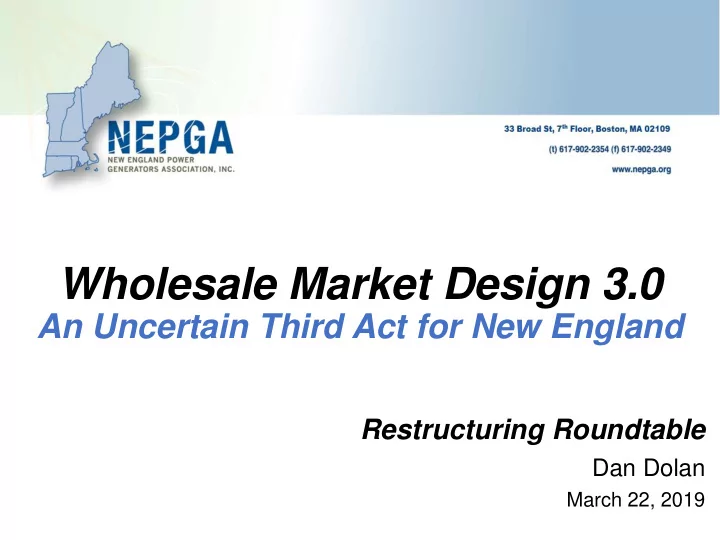

Wholesale Market Design 3.0 An Uncertain Third Act for New England Restructuring Roundtable Dan Dolan March 22, 2019
New England wholesale energy prices have declined by 56% since 2008 $100.00 $93.73 $80.00 Price per MWh $69.13 $60.00 $43.54 $40.00 $30.21 $20.00 $0.00 2004 2005 2006 2007 2008 2009 2010 2011 2012 2013 2014 2015 2016 2017 2018 Source: https://www.iso-ne.com/static-assets/documents/2019/03/20190312_pr_2018-price-release.pdf; Adjusted to 2018 dollars 2
With low energy prices coupled with plant retirements, capacity market costs have increased Source: https://iso-ne.com/static-assets/documents/2019/03/2019_reo.pdf 3
New England electricity fuel mix Coal Energy Supply 1% in 2018 Renewables 16% Natural Gas 40% Net Imports 17% Nuclear 25% Oil Source: ISO New England 1% https://www.iso- ne.com/isoexpress/web/reports/load- and-demand/-/tree/net-ener-peak-load 4
Estimated energy production sources (MWh) based on existing New England state authorities 100% State -Sponsored 90% Resources 20% State -Sponsored 80% State -Sponsored Resources Resources 46% 70% 52% 60% 50% Competitive Market 40% Resources 80% Competitive Market 30% Competitive Market Resources Resources 54% 20% 48% 10% 0% 2018 2023 2027 5
“The New England wholesale electricity market is reaching a crisis point having failed to meet the needs of individual states they serve, and the electricity resources the markets are supposed to support.” “State subsidies will beget reliability subsidies, driving consumer costs ever higher and doing away with future market-based investments for new or existing power generation.” “In the face of this looming crisis, ISO New England’s changes to the market design have been inadequate. Instead of pushing to aggressively meet state policies through markets, the ISO has sought to incorporate out-of- market actions.” “It is time for ISO New England to make a deliberate shift away from its historic cycle of out-of-market triage and toward a durable market that provides competitively- priced reliability while working with the states and their public policy mandates.” September 5, 2018 – https://www.utilitydive.com/news/a-dangerous-tipping-point-for-new- 6 englands-wholesale-electricity-market/531564/
Promoting Competitive Power Markets and Growing Zero-Emission Resources in New England By: A. Joseph Cavicchi “There are two key concerns that make the ability of existing resources to remain financially viable over the longer-term an important consideration. First, it is expected that ISO-NE will require a significant number of flexible (dispatchable) resources to respond to growing ramping requirements. In particular, resources will be needed to both ramp to respond to changes in net- load variation, and start and stop with greater frequency. While it may currently be the case that little concern has been given to the long-term viability of existing flexible resources, many of these facilities are aging and will require capital investment to remain viable over the longer term. Second, existing resources that have high going forward costs to avoid shutdown, such as a nuclear station, cannot be assumed to operate indefinitely if market revenues are insufficient to recover ongoing costs .” November 7, 2018 – https://nepga.org/wp-content/plugins/custom-post-type-attachment- 7 pro/download.php?id=MTQ3Mw==&file=MQ==
“ Recognizing that the entire New England region has a stake in ensuring a reliable energy system that also produces affordable outcomes for consumers , the New England Governors commit to work together, in coordination with ISO New England through the New England States Committee on Electricity (NESCOE), to evaluate market-based mechanisms that value the contribution that existing nuclear generation resources make to regional energy security and winter reliability. In addition, to the extent a state’s policies prioritize clean energy resources, those states commit to work together on a mechanism or mechanisms to value the important attributes of those resources, while ensuring consumers in any one state do not fund the public policy requirements mandated by another state’s laws. The New England states have demonstrated leadership in advancing market-based approaches such as the Regional Greenhouse Gas Initiative and we are hopeful collaboration can address this important issue as well.”
New England transportation & power plant CO2 emissions from 1990 to 2016 80.0 70.0 Transportation: 60.0 9% Increase since 1990 50.0 40.0 Power Plants: 30.0 46% Decrease since 1990 20.0 Transportation Power Plants Source : http://www.eia.gov/environment/emissions/state/, released October 31, 2018 10
www.NEPGA.org @NEPowerGen 11
Recommend
More recommend